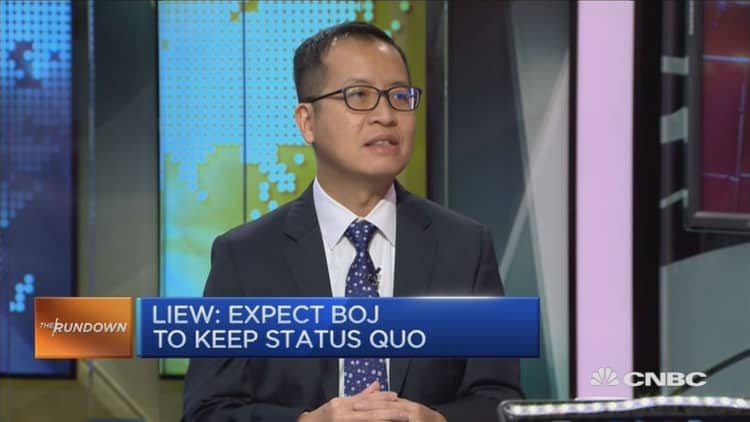The Bank of Japan said Thursday that it kept its monetary policy unchanged after its two-day meeting, but it cut inflation forecasts for fiscal years 2017/2018 and 2018/2019.
The central bank now expects inflation to be at 1.1 percent for the current fiscal year, down from its previous forecast of 1.4 percent. For the next financial year, it expects inflation to hit 1.8 percent instead of 1.9 percent.
"The timing of the year-on-year rate of change in the CPI reaching around 2 percent will likely be around fiscal 2019," the central bank said in its latest statement. It had previously said it would hit the target before the end-March 2019.
It also sounded more upbeat on the country's economy, raising its gross domestic product expectations for the current and next fiscal years to 1.8 percent and 1.4 percent, respectively. Those are higher than the 1.6 percent and 1.3 percent it previously projected.
"With regard to the outlook, Japan's economy is likely to continue its moderate expansion. Through fiscal 2018, domestic demand is likely to follow an uptrend, with a virtuous cycle from income to spending being maintained in both the corporate and household sectors, on the back of highly accommodative financial conditions and fiscal spending through the government's large-scale stimulus measures," the BOJ said.
Inflation has been the central bank's Achilles heel as price growth remains stubbornly weak even as the wider economy is now on firmer footing. Japan's Ministry of Finance data showed on Thursday that the country's exports grew 9.7 percent year-on-year in June — beating the 9.5 percent gain forecast by Reuters.
Economists had expected the BOJ to lower inflation forecasts, keep rates unchanged and hold off from expanding stimulus.

After the release of BOJ's latest statement, Credit Suisse's chief economist for Japan Hiromichi Shirakawa told CNBC's "Street Signs" that he was surprised that the central bank pushed back the timeline to achieve its 2 percent inflation target.
"That surprised me because BOJ already started tapering, I think this decision means BOJ may need to slow the pace of tapering into next year. That's inviting downward pressure on interest rates and downward pressure on exchange rate, so BOJ has decided to slightly increase stimulus even though they're tapering," Shirakawa said.
This is the sixth time the BOJ has delayed the timeline since governor Haruhiko Kuroda unveiled his asset-buying program in 2013, according to Reuters. The latest non-move also comes as major central banks around the world have started to tighten monetary policies.
But other economists saw that coming. UOB senior economist Alvin Liew told CNBC's "The Rundown" ahead of the policy statement release that chances of a delay was high as price growth in Japan has remained close to zero.
"That's the most likely case today, that they will delay the timeline. But then again, the idea of the 2 percent target, whether it is realistic or not … many people think that for the case of Japan, it may not be something that they will see in the near future," he said.
Marcel Thieliant from Capital Economics shared the view that inflation in Japan will remain well below the central bank's 2 percent target over the next few years. He wrote in a note earlier this week that inflation will be "broadly flat at around 0.5 percent next year."


